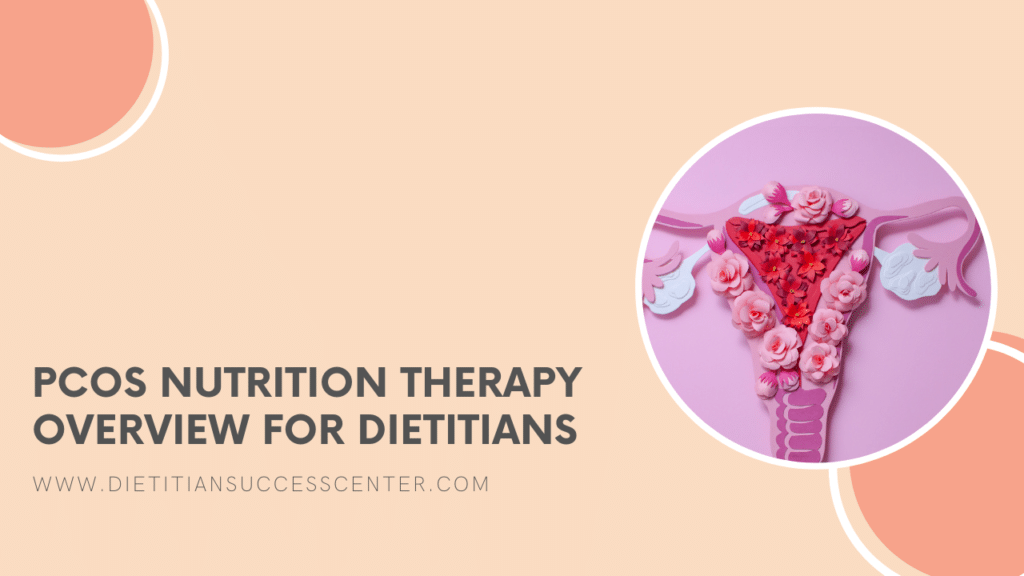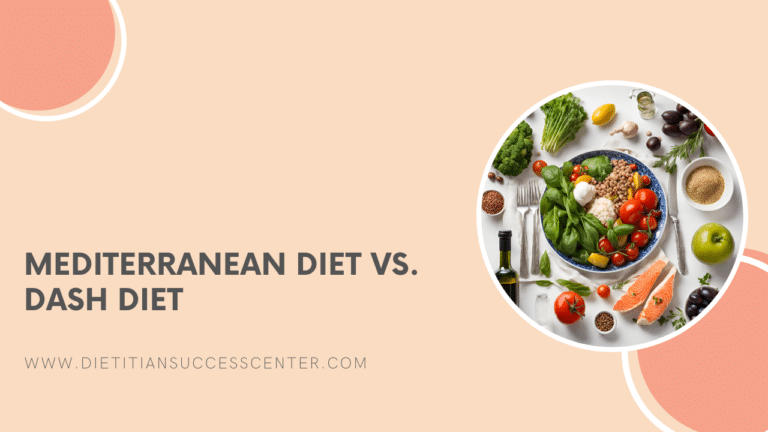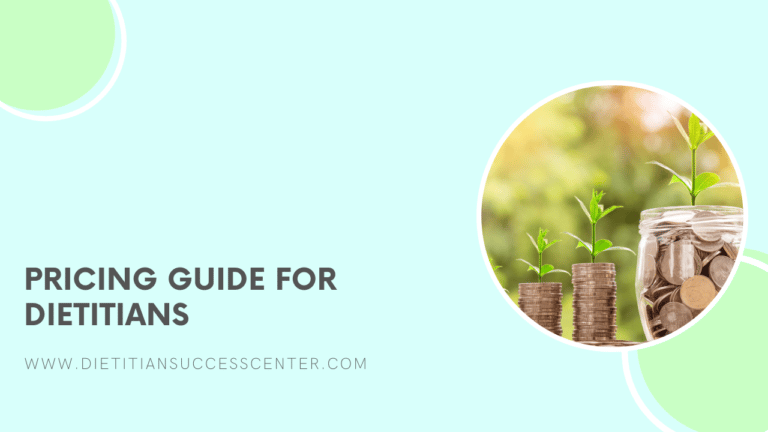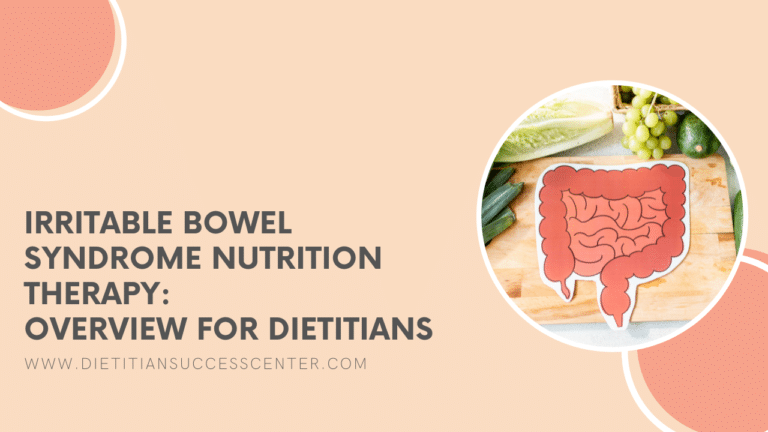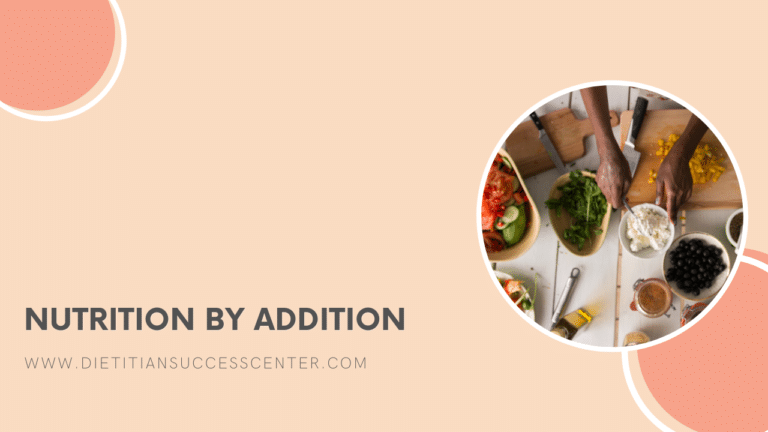
Written by Olivia Farrow, RD, MHSc
Reviewed by Krista Kolodziejzyk, RD, MPH, MBA
Update by Olivia Fournier, MAN(c), BASc (Dietetic Intern) (2024)
In this article, we share the must-know information on Polycystic Ovary Syndrome (PCOS) nutrition therapy from our PCOS nutrition course.
PCOS is the most common endocrine disorder amongst people with ovaries of reproductive age. There is an estimated global prevalence of 3-10% of the world’s population (1). Consequently, no matter where you work, you will likely encounter PCOS.
What is PCOS?
Let’s start with the basics. Polycystic Ovary Syndrome (PCOS) is an endocrine disorder characterized by high levels of androgens (hormones like testosterone), irregular menstruation and/or cysts around the ovaries (2).
Research suggests that a mix of genetic and environmental factors are responsible for PCOS, however the exact cause is still unknown (2). It is important to reassure clients with PCOS that they are not to blame for this condition.
Above all, you can’t ‘move’ or ‘eat’ your way into PCOS.
Why is this topic important?
Individuals living with PCOS can often feel confused about their diet and lifestyle. Dietitians can provide support to help prevent and manage their unique challenges.
FIrstly, PCOS can cause a variety of distressing symptoms including (3):
- Acne or skin problems
- Menstrual irregularities
- Hirsutism (excess hair growth on certain parts of the body)
- Reproductive challenges
- Weight fluctuations
- Metabolic syndrome
- Disordered eating, and commonly, binge eating disorder
PCOS can increase the risk of developing multiple comorbidities, including (4,5):
- Nonalcoholic fatty liver disease
- Sleep apnea and sleep disturbances
- Dyslipidemia
- Type 2 diabetes
- Mood disorders, like depression and anxiety
Nutrition practitioners may be able to support patients in the management and prevention of many of these conditions.
Unfortunately, individuals with PCOS have often endured years of feeling beaten down by the healthcare system, weight stigma, weight discrimination, and a lack of information and support. (6,7)
This is why it is so important to provide empathetic, and evidence-based support to individuals who are experiencing the challenging symptoms of PCOS.
Insulin Resistance Linked to PCOS
Insulin resistance is very common in PCOS (8), because of this, much of the treatment for PCOS is aimed at reducing overall insulin in the body.
We don’t know exactly what causes insulin resistance in the first place and there is no specific research that tells us, at this point. However, we do know that it might be linked to chronic inflammation, which is very often found in individuals with PCOS (8). Insulin resistance may also be a key trigger in raising androgen levels that could cause some of the clinical symptoms of PCOS (3).
The PCOS nutrition course, included in your DSC membership, summarizes evidence-based interventions for PCOS management including increasing low glycemic index and anti-inflammatory foods.
Weight Discrimination and Stigma with PCOS
Weight will often come up as a concern for clients who present with PCOS. Often, the first thing a physician will tell their patient is to “just lose weight” without receiving any follow-up information or support.
This general advice can leave people with PCOS feeling frustrated when they don’t know why their weight is fluctuating. Long-term, sustainable weight-loss may not be possible, and can lead to weight cycling and further frustration for these individuals (9).
Subsequently, weight loss is even more challenging as there are many factors contribute to fluctuations in weight, outside of diet or lifestyle, such as:
- Genetic predisposition to weight gain
- Insulin resistance and hyperinsulinemia, which is independent of BMI (10)
- People with PCOS may have a lower BMR compared to those without (11)
- People with PCOS may still feel hungry after eating, due to hunger hormone imbalances (5)
- Extreme food cravings
Together, these challenges can leave individuals managing PCOS feeling confused and frustrated about their diet and lifestyle. Anxiety and depression rates are high in people with PCOS (12). Likewise, one study on 455 women with PCOS found that 60% had binge eating disorders (13).
Nutrition Therapy for PCOS
Registered Dietitians play a central role in the interdisciplinary healthcare team for PCOS.
A 2019 study on over 1000 women with PCOS found that the majority of women don’t follow any specific nutrition guidelines for PCOS management, while over half follow restrictive diets (9).
Plenty of individuals rely on the internet for diet advice and a small percentage follow diets provided by their medical doctor.
This also highlights an opportunity for dietitians to be present when clients seek health information online. The more evidence-based practitioners who are sharing high-quality content on platforms like blogs, Instagram and other social media sites, the better. There’s still a need for this information.
Goals of PCOS Nutrition Therapy
From a practical standpoint, the main goals of lifestyle interventions and medical nutrition therapy for PCOS might include:
- Blood sugar stabilization and addressing insulin resistance
- Reduction of androgens
- Reduction of inflammation
- Symptom management (e.g. cravings, acne, hirsutism, fatigue) – which often also results from working on goals 1-3
So, how exactly do we achieve these goals?
There is no single dietary approach that has been established to improve long-term health outcomes for individuals with PCOS (4,6). Rather dietary interventions should be balanced and tailored to individual food preferences and flexibility, with avoidance of restrictive or nutritionally unbalanced diets (6).
Commonly used dietary and lifestyle interventions may include:
-
- Adjusting macronutrient distribution, though current research does not support any specific optimal macronutrient distribution for PCOS.
- Recommending the DASH Diet, which can help improve insulin sensitivity, independent of weight loss. (14)
- Emphasizing low GI carbohydrates, to promote blood sugar stabilization, improve insulin sensitivity, and increase menstrual regularity. (15)
- Emphasizing anti-inflammatory foods to address chronic inflammation
- Increasing frequency of meals, and avoiding skipping meals
- Mindful eating, as sporadic eating and dieting behaviors are very common
- Physical activity, and setting SMART activity goals
- Supplements such as those that address insulin resistance and androgen levels, such as inositol and N-Acetyl Cysteine
- Supplements to correct any nutritional deficiencies, such as Zinc, Calcium, Magnesium, Vitamin D, and B-group vitamins. (16)
Overall, health professionals working with patients with PCOS should prioritize empathetic, client-centered care and support clients in setting realistic and balanced nutrition and lifestyle goals.
Summary
To summarize, PCOS is an endocrine disorder that can cause a variety of distressing symptoms. Dietary strategies can improve the quality of life of people living with PCOS and as diet and lifestyle modification is the primary treatment approach, it is important for health professionals to feel confident with nutrition therapy for PCOS. Providing empathetic, client-centered care is key to promoting body image and reducing weight discrimination for patients with PCOS.
At DSC, we make it easier for dietitians and dietetic students to build expertise in topics including PCOS. Our PCOS nutrition course, ready-to-use client handouts, and community can help you feel more confident with nutrition counseling and medical nutrition therapy for PCOS.
DSC’s PCOS Nutrition Course
We dive into each of these in more detail in the DSC PCOS nutrition course. You also get instant access to PCOS resources for dietitians including a full 3-part video course with case studies, evidence summary, supplement guide and client-facing PCOS diet pdfs.
Dietitian Success Center is THE professional development resource for dietitians and dietetic students. Our mission is to make it easier for dietitians and dietetic students to build expertise. We do this through evidence-based online nutrition courses, community and ready-to-use client handouts. Plus – we give you the tools to start and grow your dietitian private practice!
Disclaimer: the information provided in all written materials is for educational purposes only and is not to be used as medical advice or to diagnose or treat a medical disease. It is strictly for informational purposes and is general in nature. Dietitian Success Center Inc. is not responsible and cannot be held liable for any actions or inactions taken related to the information provided. Consult with your local medical provider before implementing any dietary changes. It is hereby understood that the information provided does not replace medical advice provided by your healthcare provider.
References:
1. Wolf WM, Wattick RA, Kinkade ON, & Olfert MD. (2018). Geographical Prevalence of Polycystic Ovary Syndrome as Determined by Region and Race/Ethnicity. International journal of environmental research and public health, 15(11), 2589. https://doi.org/10.3390/ijerph15112589
2. Williams T, Mortada R, & Porter S. (2016, July 15). Diagnosis and treatment of polycystic ovary syndrome. AAFP American Academy of Family Physicians. https://www.aafp.org/afp/2016/0715/p106.html#abstract
3. Raymond J & Morrow K. 2021. ”Medical Nutrition Therapy for Thyroid, Adrenal, and Other Endocrine Disorders”. In Krause and Mahan’s Food & The Nutrition Care Process: 15th Edition. Page 649. Elsevier, Inc
4. Williams T, Moore JB, & Regehr J. Polycystic Ovary Syndrome: Common Questions and Answers. Am Fam Physician. 2023 Mar;107(3):264-272. PMID: 36920819. https://pubmed.ncbi.nlm.nih.gov/36920819/
5. Ee C, Pirotta S, Mousa A, Moran L, & Lim S. Providing lifestyle advice to women with PCOS: an overview of practical issues affecting success. BMC Endocr Disord. 2021 Nov 23;21(1):234. doi: 10.1186/s12902-021-00890-8. PMID: 34814919; PMCID: PMC8609880. https://pubmed.ncbi.nlm.nih.gov/34814919/
6. Monash University. “International evidence-based guideline for the assessment and management of polycystic ovary syndrome.” (2023) Melbourne Australia. Available from https://www.monash.edu/medicine/mchri/pcos/guideline
7. Gibson-Helm ME, Lucas IM, Boyle JA, Teede HJ. Women’s experiences of polycystic ovary syndrome diagnosis. Fam Pract. 2014 Oct;31(5):545-9. doi: 10.1093/fampra/cmu028. Epub 2014 Jun 12. PMID: 24925927. https://academic.oup.com/fampra/article/31/5/545/536592?login=false
8. Grassi A. (2020). PCOS: The Dietitian’s Guide. ISBN: 9780985116422
9. Pirotta S, Barillaro M, Brennan L, Grassi A, Jeanes YM, Joham AE, et al. “Disordered Eating Behaviours and Eating Disorders in Women in Australia with and without Polycystic Ovary Syndrome: A Cross-Sectional Study.” Journal of clinical medicine vol. 8,10 1682. 14 Oct. 2019, doi:10.3390/jcm8101682 https://pubmed.ncbi.nlm.nih.gov/31615157/
10. Marshall JC, & Dunaif A. (2012). Should all women with PCOS be treated for insulin resistance?. Fertility and sterility, 97(1), 18–22. https://doi.org/10.1016/j.fertnstert.2011.11.036
11. Georgopoulos NA, Saltamavros AD, Vervita V, Karkoulias K, Adonakis G, Decavalas G, et al. (2009). Basal metabolic rate is decreased in women with polycystic ovary syndrome and biochemical hyperandrogenemia and is associated with insulin resistance. Fertility and Sterility, 92(1), 250–255. https://doi.org/10.1016/j.fertnstert.2008.04.067
12. Blay SL, Aguiar JV, & Passos IC. Polycystic ovary syndrome and mental disorders: a systematic review and exploratory meta-analysis. Neuropsychiatr Dis Treat. 2016 Nov 8;12:2895-2903. doi: 10.2147/NDT.S91700. PMID: 27877043; PMCID: PMC5108561.
13. Jeanes YM, Reeves S, Gibson EL, Piggott C, May VA, & Hart KH. Binge eating behaviours and food cravings in women with Polycystic Ovary Syndrome. Appetite. 2017 Feb 1;109:24-32. doi: 10.1016/j.appet.2016.11.010. Epub 2016 Nov 4. PMID: 27825940.
14. Shirani F, Salehi-Abargouei A, Azadbakht L. Effects of Dietary Approaches to Stop Hypertension (DASH) diet on some risk for developing type 2 diabetes: a systematic review and meta-analysis on controlled clinical trials. Nutrition. 2013 Jul-Aug;29(7-8):939-47. doi: 10.1016/j.nut.2012.12.021. Epub 2013 Mar 6. PMID: 23473733. https://www-sciencedirect-com.subzero.lib.uoguelph.ca/science/article/pii/S0899900713000105
15. Shishehgar, F., Mirmiran, P., Rahmati, M. et al. Does a restricted energy low glycemic index diet have a different effect on overweight women with or without polycystic ovary syndrome?. BMC Endocr Disord 19, 93 (2019). https://doi.org/10.1186/s12902-019-0420-1 https://bmcendocrdisord.biomedcentral.com/articles/10.1186/s12902-019-0420-1
16. Alesi S, Ee C, Moran LJ, Rao V, & Mousa A. Nutritional Supplements and Complementary Therapies in Polycystic Ovary Syndrome. Adv Nutr. 2022 Aug 1;13(4):1243-1266. doi: 10.1093/advances/nmab141. PMID: 34970669; PMCID: PMC9340985 https://www.sciencedirect.com/science/article/pii/S2161831322000163?via%3Dihub


